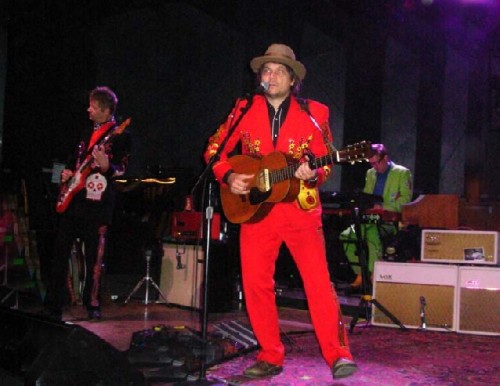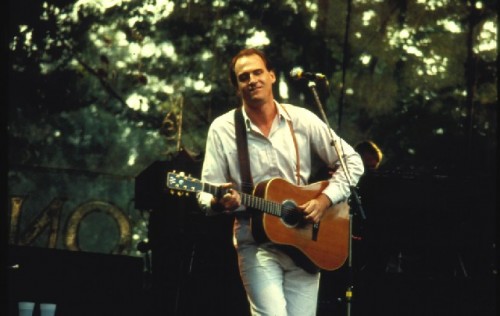Rocking Tanglewood Wilco the Real Deal
Reaching Out For New Audiences
By: Steve Nelson - Aug 13, 2008
Last summer a storm blew in over Tanglewood. Not the usual summer cloudburst, but a raging debate in the pages of The Berkshire Eagle about what place, if any, there should be for rock music at the venerable classical music venue.
Tanglewood has long dabbled with softer folk and country sounds like Peter Paul and Mary, Linda Ronstadt and Lee Ann Rimes, who have appeared on recent July 4th shows. James Taylor, a local favorite and in a category by himself, always draws the largest crowds of the summer, some 18,000 a night, and is likely now ensconced as the Independence Day (and eve) attraction after his performances this summer.
This is in stark contrast to the show on the Fourth in 2007, when the bill featured two bands who turn up their amps, the New Cars and the James Montgomery Blues Band. But heavy rain washed out lawn picnics, and the bands played to an audience of just hundreds in the Shed.
Montgomery deserved better. Perhaps not well known to the New Yorkers who ring the till at the Tanglewood ticket window, he's been a highly-respected fixture of the blues scene in eastern New England for decades. The original Cars came out of Boston to score big hits on the radio and MTV, but the band booked by Tanglewood had only two of its original members, not including quirky frontman Ric Ocasek. Derided by band loyalists and some critics as the Used Cars, the reconstituted ensemble turned in a better-than-expected performance for what in effect was not much more than a Cars cover band.
It could have been worse. The New Cars were a replacement for the original booking of Journey, arena rockers who cranked out a string of hit singles and albums in the late '70s and early '80s. With nearly 20 different musicians having played under the Journey name over the years, it's hard to say whether this band is the real Journey. Like the New Cars, its longtime lead singer Steve Perry had split. The current band seems more like a live Journey karaoke session for whoever is on lead vocals at the moment.
Ironically, later that summer Journey's 1981 hit, "Don't Stop Believin'," found renewed popularity as the soundtrack for the notorious "cut to black" scene that marked the end of the HBO series "The Sopranos." Whether Tony got whacked, we'll never know. But shortly before their Tanglewood gig, Journey's latest lead singer got offed from the band and they cancelled, opening the way for The New Cars.
This, then, has been the checkered recent history of popular music at Tanglewood. And in the Sunday paper just before the 2007 season opened, the Eagle ran a story about red ink on the hallowed green grass, coupled with an editorial urging the management of the Boston Symphony Orchestra to bolster Tanglewood's finances by broadening its musical offerings to include more popular music, including rock. Having run rock clubs in Boston and Western Mass. in the musical glory days of the late Sixties, but also loving summer nights of Mozart and Mahler on the lawn at Tanglewood, I chimed in with a letter to the editor in support of the editorial.
The response from the Guardians of the Faith among the Eagle's columnists was swift and indignant. Clarence Fanto bemoaned the threat to Tanglewood's classical music mission and Alan Chartock urged us to get down on our knees and thank Tanglewood. Classical music critic Andrew Pincus ran a piece in which BSO managing director Mark Volpe maintained that there was just no room in Tanglewood's packed schedule to accommodate more popular music. In a follow-up Op-Ed piece in the Eagle, I noted that on the July and August 2007 calendar, Tanglewood was dark about a quarter of time during those two months. And I pressed the idea of bringing in select rockers who merited being presented at this great venue.
The resistance to rock is a bit odd, because Tanglewood has a now-forgotten tradition of hosting major rock acts. In the late Sixties and early Seventies it presented a Contemporary Trends series featuring the likes of Janis Joplin, The Who, Sly and the Family Stone, the Paul Butterfield Blues Band, and Miles Davis in his electrified phase. And they didn't just slip them in the back door. Advertising for the series prominently bore the names of BSO maestro Erich Leinsdorf and contemporary music meister Gunther Schuller.
The reason the series was cancelled in 1972 is said to have been the usual business of the music being too loud and the audiences too rowdy, to say nothing of the smoke being too cannaboid. Well, I've heard all that before: different places, same story. But times have changed. The bands and us rowdies behave better these days, and we are much more likely to prefer a nice Sauvignon Blanc to a joint.
When winter comes to the Berkshires, last summer is long forgotten, as was the Great Rock Debate. And as unexpectedly as the first signs of spring, so was the Tanglewood announcement in April that indie rockers Wilco would be appearing in August. Well, now I am ready to get down on my knees. Unlike Journey and the New Cars, Jeff Tweedy and company are the real thing, major contemporary artists with musical roots tracing back to the Beatles. And their two albums of Woody Guthrie's music connect them in spirit to the Berkshire's own Guthrie clan.
How did Wilco wind up at Tanglewood? Apparently they had approached the Boston Pops looking for an outdoor venue in which to perform, and BSO management responded with the Tanglewood gig. Not surprisingly, tickets in the Shed went quickly, as did seating on the lawn before Tuesday night's show. It remains to be seen, of course, where Tanglewood goes with rock in summers to come. But for now at least, the barbarians are welcome at the gate. Roll over, Beethoven.
Steve Nelson, of Washington, Mass. is president of the Music Museum Of New England, at http://www.mmone.org






